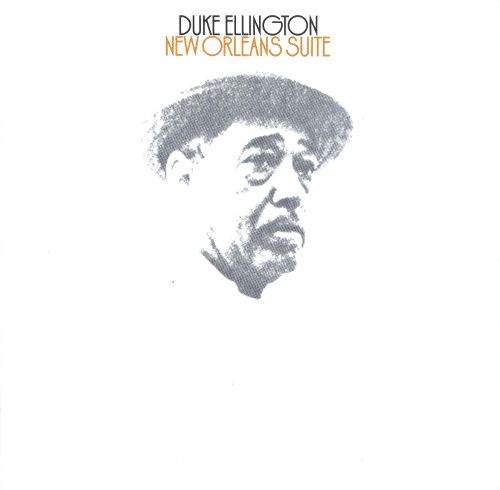
In 1967 Duke Ellington said, ""People ask ‘when are you going to retire.' Retire to what? Stagnation?" The bandleader turned 68 that year, an age when many are at least contemplating retirement, but Ellington remarked, "My band and I travel all over the world, see the sights and people. You can't beat that… I visited a friend who'd retired. His wife saw him sitting there, doing nothing, and told him: ‘Take out the garbage.' That's not for me."
In the years to come Ellington sustained a pace of touring, composing, and recording that would have been the envy of an artist half his age. At the same time, in the volatile rock ‘n roll climate of the mid-to-late 1960s, he was keeping his musical mind open and continuing to grow creatively. In the midst of the media acclaim that greeted the Beatles' Sergeant Pepper's Lonely Hearts Club Band in 1967, the New Yorker invoked Ellington by way of comparison:
Of course you can't talk about the Beatles without mentioning the transcendent Duke Ellington. Just as he has never fit into the jazz scheme of things, the Beatles don't fit into the rock-and-roll scheme. They are off by themselves doing their own thing, just as Ellington always has been… like Ellington, they are working in that special territory where entertainment slips over into art.
Albums such as ...And His Mother Called Him Bill, The Afro-Eurasian Eclipse, The Latin American Suite and The New Orleans Suite, and Ellington's second and third sacred concerts, as well as the privately-recorded The River, all offer evidence that the New Yorker's 1967 assessment holds true for the final stretch of Ellington's career as well.
"He Had To Work Harder"
The most significant event in Ellington's later years came on May 31, 1967, when his longtime composing and arranging partner, Billy Strayhorn, passed away from cancer at the age of 51. Ellington was devastated, as Harvey Cohen notes in his book Duke Ellington's America:
In the weeks after Strayhorn's death, Ellington slept far more than usual, produced less music, and Dr. Logan pronounced Ellington depressed. "It was a big blow to the old man," remembered Mercer Ellington. In terms of his work and personal life, things would now become more difficult for Ellington, but he rose to the challenge. "When Strayhorn passed, Ellington was in the middle of various projects, and realizing he did not have Strayhorn at his side, he found that in order to cover the same ground that he had been covering… he had to work harder," according to Mercer. "If anything, Strayhorn's passing stimulated Ellington's ability to write more music than he'd ever had to do before."
The death of Strayhorn would prove to be a beginning as well as an ending, an emotional catalyst that launched Ellington's last great creative period. Here's his poignant solo-piano performance of Billy Strayhorn's "Lotus Blossom," recorded as Ellington's band was packing up around him during the sessions for the 1967 Strayhorn tribute album … And His Mother Called Him Bill:
The following year Ellington went into the studio with another icon who had roots in the swing era—Frank Sinatra. The album, arranged by Billy May, does not sound especially Ellingtonian, but it was still a milestone for two of America's most celebrated musical artists:
Ellington also continued his global travels with a journey to Latin America, which helped inspire his Latin American Suite. Michael McGerr says that Ellington's late-period work reflected his times in two ways-his longstanding interest in black identity and history, and the increasing interconnection of world cultures:
Some of Ellington's most personally significant work in his later years went into his three Sacred Concerts, creative testaments to Ellington's religious beliefs. For the composer, such convergences of the spiritual and the secular were a way of celebrating the broad spectrum of life:
Another late-period extended Ellington work, the New Orleans Suite, from 1970, provided a tribute to the capital city of jazz as his career neared its close. New Orleans Suite brims with a diverse set of melodic colors worthy of its subject, including the rousing "Second Line," the groovy, laid-back lyricism of "Portrait of Mahalia Jackson," and the slow gospel swing of "Blues for New Orleans," which puts the full power of the Ellington saxophone section on display, gives us Johnny Hodges' last saxophone solo on record, and provides a showcase for organist Wild Bill Davis:
In the late 1960s and early 70s honors and awards began to accrue to Ellington. Though he had infamously been denied a Pulitzer Prize in 1965, when the Pulitzer's advisory board overrode its music jury's selection of Ellington, four years later he was invited to the White House for a celebration of his 70th birthday, hosted by President Richard Nixon. Ellington was often wary of such recognition, however, particularly when it emphasized his past achievements. With his work-a-night, global-scale touring and ongoing composition and recording-one reason that he kept his band together-he wished very much to be seen as a vital and present-day artist. In keeping with that spirit, he also discouraged the ever-increasing talk about his age. "Who's 70?" he told a reporter. "That's an awful weight to put on an up-and-coming man like me. Let's not talk about it. It's exhausting." Though physical exhaustion proved more and more difficult to hold at bay in Ellington's early seventies, creative exhaustion did not accompany it; music such as "Something," from the 1971 work The Goutelas Suite, shows that his gift for lyrical melodies endured:
That same year Ellington made an album that many consider to be a late-period masterpiece, and that counts younger modern sound artists such as DJ Spooky among its champions. Consider Ellington an early advocate of world music, and take The Afro-Eurasian Eclipse as rhythmic and melodic evidence. Ellington introduces the opening number, "Chinoiserie," with a rap (in the old old-school sense of the word) that namechecks Marshall McLuhan and touts the onset of a global cultural identity. The album as a whole reflects what the late Ellington scholar Eddie Lambert noted: that Ellington's late-period work often featured exoticism that hearkened back to his "jungle-music" period of the 1920s. When it was posthumously released in 1976, critic Gary Giddins gave it high praise in The Village Voice, writing "Just as ‘Latin American Suite' was melodic in motive, Afro-Eurasian Eclipse is about rhythm, one-chord harmonies, and chants. This one-world music reflects the ongoing jazz tradition as well: r and b, rock ‘n roll, Albert Ayler, and Cecil Taylor are all woven into the fabric." In concert, Ellington often accompanied the performance of "Chinoiserie" with what has been described as "a ritual dance."
The Afro-Eurasian Eclipse was recorded in 1971 but went released until 1976, two years after Ellington's death. Ellington recorded so much in his final decade that new material continues to surface today. He also, in Michael McGerr's view, expanded and consolidated his lifelong creative ambitions, and did so as he lost many of the musicians who had been with him for decades, such as saxophonist Johnny Hodges and trumpeter Cootie Williams, either to death or retirement. Still he soldiered on, touring the Soviet Union in 1972 and publishing an autobiography, Music Is My Mistress, in 1973. That same year, however, Ellington was diagnosed with lung cancer. Though he kept up his work pace as much as possible, by early 1974 he entered a hospital as his health declined irreversibly. Even as he lay dying that spring, he continued to work on new compositions-the orchestral work "Three Black Kings" and music for a jazz opera called Queenie Pie. On May 24, only recently turned 75, he finally succumbed to the cancer that had been ravaging his body. In his eulogy at Ellington's funeral, critic and Ellington champion Stanley Dance said,
"In the truest sense of the phrase, he was a citizen of the world. That is a cliché perhaps, but how few are those who deserve it as he did. He was loved throughout the whole world, by all levels of society, by Frenchmen and Germans, by English and Irish, by Arabs and Jews, by Indians and Pakistanis, by atheists and devout Catholics, and by communists and fascists alike. . . .
As a musician, he hated categories. He didn't want to be restricted, and although he mistrusted the word 'jazz,' his definition of it was 'freedom of expression.' If he wished to write an opera, or music for a ballet, or for the symphony, or for a Broadway musical, or for a movie, he didn't want to feel confined to the idiom in which he was the unchallenged acknowledged master.
His career cannot be described in a few minutes. Where would one start? With the composer, the bandleader, the pianist, the arranger, the author, the playwright, the painter? He was a jack-of-all-trades, and master of all he turned his hand to. Or should one start with the complex human being—at once sophisticated, primitive, humorous, tolerant, positive, ironic, childlike (not childish), lionlike, shepherd like, Christian…? He was a natural aristocrat who never lost the common touch. He was the greatest innovator in his field and yet paradoxically a conservative, one who built new things on the best of the old and disdained ephemeral fashion.
…his records are the greatest of his gifts to us. Here one can enter a unique world, filled with his dreams, emotions, fantasies, and fascinating harmonies. He brought out qualities in his musicians they did not always know they possessed. He had the knack of making good musicians sound great, and great musicians sound the greatest. As the best arranger in the business, he was able to furnish them with superb backgrounds, and as one of the most inventive—and underrated—of pianist, he gave them inspiring accompaniment. He was, in fact, more of an inspiration than an influence, and though he made no claim to being a disciplinarian, he ruled his realm with wisdom.
Just a few months before his death, Ellington, visibly and audibly exhausted, had presented his third sacred concert—a work generally considered uneven, but with several high points that show that even in the ever-growing shadows of mortality, this maestro of music beyond category could still summon greatness. Upon the posthumous release of the third sacred concert, jazz critic Gary Giddins wrote
Despite great adversity, he was even in these last months a perceptive and unflinching artist. Indeed, the best moments of ‘The Majesty of God' suggest that his art was still peaking.
More Duke Ellington On Night Lights
Outtakes
Also see this discussion at the Organissimo jazz bulletin board: Must-Have Ellington Dates Mid-to-Late 60s and 70s
Listen to Duke Ellington's final interview with Voice of America jazz DJ Willis Conover (September 5, 1973)
Special thanks to Maristella Feustle, Michael McGerr, Chris Parker, and Casey Zakin.
(Portions of this program's script previously appeared in a post that I wrote for NPR's A Blog Supreme: Duke Ellington: Highlights Of His Twilight)









